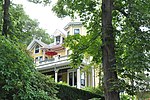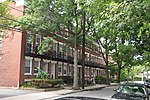Brandon Hall station

Brandon Hall station is a light rail stop on the MBTA Green Line C branch in Brookline, Massachusetts. The station's name is an anachronism, as it was named for Brandon Hall, a large hotel built in 1904 just south of the station which burned down on April 26, 1946, after housing 400 SPARS during World War II.Brandon Hall station has two side platforms serving the line's two tracks. It is not accessible, although a wheelchair lift allows accessible passage between the two elevations of the two halves of Beacon Street at the station. With 356 daily passengers by a 2011 count, Brandon Hall was the second-least-used stop on the C branch after Hawes Street.Track work in 2018–19, which included replacement of platform edges at several stops, triggered requirements for accessibility modifications at those stops. By December 2022, design for Brandon Hall and seven other C Branch stations was 15% complete, with construction expected to take place in 2024.
Excerpt from the Wikipedia article Brandon Hall station (License: CC BY-SA 3.0, Authors, Images).Brandon Hall station
Beacon Street,
Geographical coordinates (GPS) Address Nearby Places Show on map
Geographical coordinates (GPS)
| Latitude | Longitude |
|---|---|
| N 42.339683 ° | E -71.129327 ° |
Address
1501 Beacon St
Beacon Street 1501
02446
Massachusetts, United States
Open on Google Maps









